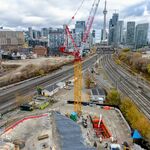simuls
Senior Member
I'd look at places like Regina, Saskatoon, Winnipeg, Halifax or go outside to places like Argentina. Here's an interesting link that will outline various ROI's for rentals around the world and clearly illustrates why many expensive markets are actually the worst to invest in.
http://www.globalpropertyguide.com/press-relations/Most-expensive-real-estate-markets-in-2009
It's also interesting to note that, considering most real estate in the world lost value vs. Toronto's gaining, a conservative estimate would move Toronto from 42nd most expensive in the world to 16. That's a HUGE jump in 1 year and unsustainable.
http://www.globalpropertyguide.com/press-relations/Most-expensive-real-estate-markets-in-2009
It's also interesting to note that, considering most real estate in the world lost value vs. Toronto's gaining, a conservative estimate would move Toronto from 42nd most expensive in the world to 16. That's a HUGE jump in 1 year and unsustainable.
Last edited:




